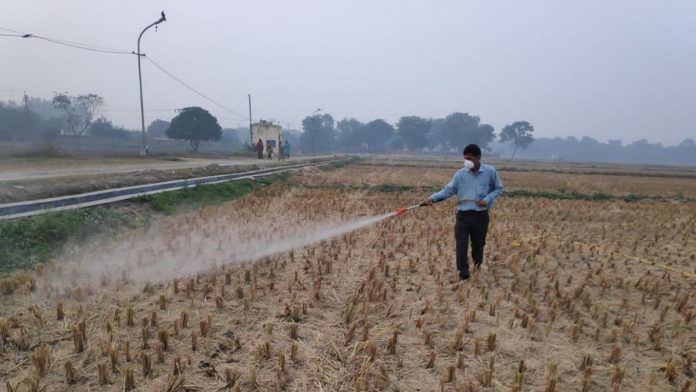Gurmeet Singh, a 40-year-old farmer from Punjab’s Katianwali village, has not set fire to his stubble even once in the past five years. This is because he has been using the much-talked about ‘decomposer’ capsules that were developed by the Indian Agricultural Research Institute (IARI). The capsules, also known as the Pusa tablets after the area in Delhi where the institute is located, consists of a combination of microbes that hastens the process of decomposition in plants.“I have been using Pusa tablets for the past four years. At first, they were being used on my field for research purposes and this year again it was applied,” Gurmeet told ThePrint. He added: “I have benefited greatly from this. I haven’t set fire on the field for the past five years, I haven’t burnt a single grain and the quality of soil and yield have also improved.” For the past few weeks, these Pusa tablets have been the subject of much speculation as an effective alternative to stubble burning. According to the System of Air Quality and Weather Forecasting And Research (SAFAR), a government-run monitoring agency, stubble burning from the farms in Punjab and Haryana has contributed to 42 per cent of the air pollution affecting Delhi on certain days.
As a result, the Delhi government began advocating the use of these decomposer tablets developed by the IARI scientists.Following a successful field trial in North West Delhi’s Hiranki village in October, Chief Minister Arvind Kejriwal had said, “Pusa bio-decomposer has been successful. It has completely decomposed the stubble and turned it into manure. Farmers can now start the sowing of the next crop in the fields.”
Pusa tablets a ‘microbial consortium’
The Pusa capsules were developed by IARI scientists Dr K. Annapurna, Dr Livleen Shukla and their team of senior research fellows and technical workers. In a telephonic interview with ThePrint, Dr Annapurna said, “We started researching on this five years back. During that time, the (stubble) burning issue had started on a large scale. So we took up this programme to try and find out the different microbe combinations that will work as a degradation potential and then zeroed in on a particular combination.” She explained that the capsule comprises a “microbial consortium” — a combination of different microbes — which has the “the ability to produce various hydrolytic enzymes, which are responsible for the degradation of the polysaccharide that are present in the cell walls of the plants”. The cell walls of plants are made up of polysaccharide cellulose and breaking it down accelerates the process of degradation. The scientists developed the capsule form of this microbe combination about a year-and-a-half ago. “We started this because we needed to give farmers the compound in a form that is easy to transport,” Annapurna said.
How the ‘decomposer’ capsules work
To fasten the process of stubble decomposition, four Pusa capsules have to be dissolved in water to make a 25-litre solution, which is enough to spray on one hectare of land. After the solution is sprayed, it takes about 20 to 25 days for the crop remnants to decompose. “We have provided 2,000 capsule kits (each containing four capsules) to the Delhi government, and they prepared the solution under our guidance and sprayed it on the farmer’s field. So with 2,000 kits they covered almost 2,000 hectares of land,” Annapurna told ThePrint. An official from the Delhi government’s Development Department, which oversees agricultural activities in the national capital territory, explained that the spraying of the solution in Hiranki, Najafgarh, Matiala, Mundka and Badarpur areas had yielded a 95 per cent success ratio. “In Hiranki village, there was so much stubble that we weren’t able to walk through it. The mixture was sprayed properly on the stubble and after that a tractor was used to roll it in and after 20 days, all of it got converted into compost,” the official, who did not wish to be named, told ThePrint. On 7 November, the Delhi government also constituted a 15-member committee to assess the effectiveness of these capsules and prepare a report for CM Kejriwal. “After that, we will submit everything about this process in the Supreme Court so that they can tell Haryana, Punjab, Uttar Pradesh and the Central government as well to get this implemented,” the official said. Apart from Delhi, Uttar Pradesh, West Bengal and Telangana governments have also acquired kits from the institute as did several individual farmers from Madhya Pradesh, Rajasthan, Maharashtra and Karnataka. Punjab, which accounts for a significant number of stubble burning cases, had also acquired 200 of such kits from IARI. ThePrint reached several members of Punjab’s agricultural department, including Secretary Anirudh Tiwari, via calls and messages but received no response till the publishing of this report. Punjab’s former agriculture department director, Sutantar Singh Airi, said, “Although these capsules decompose the crop 100 per cent, findings of the Punjab Agriculture University indicated that the soil would have to be mixed properly, which would have meant additional effort for the farmers.” “So, while I was in the department (till September) we had made a programme to get this tried along with IARI in 4-5 districts to gain clarity. This is helpful, but our problem is also that the window between harvesting and sowing is very short, just 20 days,” he added. Farmers enthusiastic but some skepticism remains Farmers, especially from the Hiranki region in Delhi, were impressed by the capsules but are still skeptical about the effect they may have on their land’s fertility. On 23-year-old Sumit Rajput’s land in Hiranki, which is tended by his father Prakash Veer, stubble burning was not carried out for the first time in years this October. The decomposer capsules were sprayed on his field on 12 October, amid much fanfare and in the presence of Kejriwal. By 25 October, 70 per cent of the stubble has decomposed and on 4 November — when journalists, government officials and scientists began thronging his field once more — there was nothing left of the stubble. “Normally, we would burn the stubble or with a tractor we would fill the field up with water so it would decompose but that would take some time. This (the capsules) had quickened the process. We would face a lot of problems from burning the stubble — the chalans (penalties) and the pollution. On top of that even the animals in the farm would get affected,” Rajput told ThePrint. When asked if his family would use the capsules again, he said that it would depend on the yield of the wheat crop. “We have sowed wheat four days ago and if that is harvested well and we see that the spray hasn’t damaged anything, then we will put this again next time. People in the village are also suspicious that this might be poisonous. But once we get a good harvest, everyone will know,” he said. Meanwhile, in Punjab’s Moga district, Tarseem Singh has been using a mulching technique for the past three eyes to avoid burning stubble. This year, however, Singh acquired the decomposer capsules, which he believes will be the “cherry on top”. “We are trying it out. They’ve (Pusa scientists) have given us a time of 20-25 days. We have a mulching technique in which we make a layer of stubble and then we put water in it so that it germinates well. This decomposer that we got will then will be very beneficial for us,” he said. For Gurmeet, the capsules have been nothing short of a miracle. According to him, what had been a barren 4-acre-land worth Rs 1 lakh is now valued at Rs 10 lakh because of the capsules. “I now grow varieties of basmati rice, varieties of wheat and that land is now fertile,” he said. “There has been no support from the Punjab government. I would come via train to Delhi and get these from Pusa, but I have taken an oath to keep using this technique,” Gurmeet added.
This news has not been edited by Apni Kheti staff but has been published by various news feeds
Source: The Print










